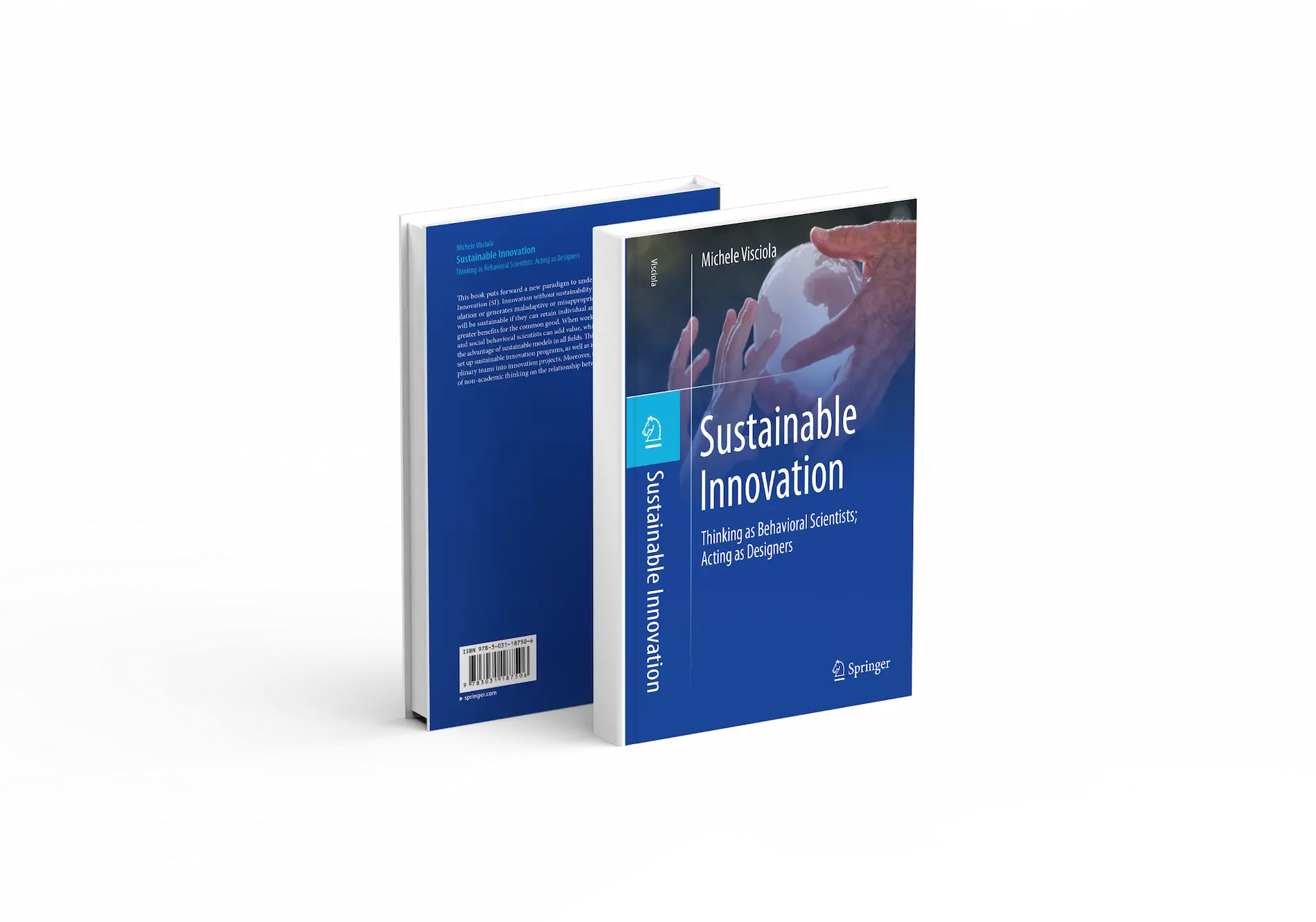A new paradigm to understand and implement Sustainable Innovation
Innovation is sustainable if and when it fulfills the basic aim of preventing and correcting the social consequences of bounded rationality.


Michele Visciòla
Michele Visciòla is president and co-founder of Experientia. Over the course of his career he has directed project teams on prominent topics, anticipating trends and developing new research languages, in numerous sectors. Michele has more than 10 years of teaching experience divided between Politecnico di Milano and Bicocca Unversity Milan. He has written several scientific publications, articles and books; was part of the core team that founded World Usability Day. He is Master and Professor of the DeTao Academy in behavioral design and modeling.
Part I
A Common Ground for Sustainable and Responsible Innovation
Chapter 1
Understanding Behavior for Sustainable Innovations
1.1 Cognitive engineering and emotional engagement
1.2 Cognitive automatism
1.3 Dual Processes and Heuristics in Human Judgment
1.4 Availability of Judgment and Action Patterns
1.5 Context Dependence
1.6 Dependence of the Reference Model
1.7 Propensity for transformation
1.8 Resilience
Part I
A Common Ground for Sustainable and Responsible Innovation
Chapter 2
The determinants of behaviors
2.1 Cumulative and Additive Effects of Experiences
2.2 Elderly Lifestyles and Sustainable Services in Singapore
2.3 Security Perception and Urban Regeneration in Northern Italy
2.4 Access to Cure and the Proximity Ecosystems in China
Part I
A Common Ground for Sustainable and Responsible Innovation
Chapter 3
The Fragility of Cooperation
Part II
Disclosing Value through Behavioral Design
Chapter 4
Design Paths
4.1 Design Constraints
4.2 Dark Patterns
4.3 Softly Nudging and Selective Drifts
4.4 The inescapability of design’s responsibility
4.5 Descriptive and Prescriptive Paths
4.6 Behavioral modeling
Part II
Disclosing Value through Behavioral Design
Chapter 5
Intentional Behavioral Design
5.1 Four values of Behavioral Design
5.2 Value Disclosure with Design
Part III
Shaping Change
Chapter 6
Change and Innovation
6.1 Technological innovations and disruptive technological innovations
6.2 Visions and Narratives Guide Technological Innovation
6.3 Biological Evolution and Cultural Innovations
6.4 Cultural Selection Underpins Sustainable Innovation
Part III
Shaping Change
Chapter 7
7.1 Spontaneous and induced behavioral change
7.2 Proximity and voluntary change
7.3 Proximity in time
7.4 Space Proximity
7.5 Social and Cultural Proximity
Part III
Shaping Change
Chapter 8
Behavioral Change and Heterogeneity
8.1 Behavior Moderators Traits
8.2 Taxonomy of Moderators and Heterogeneity of Behaviors
8.3 Distributive Effects of Behavior Influence Procedures
8.4 Behavior Models
Part IV
Accelerating Sustainable Innovation
Chapter 9
Behavioral Change Design
9.1 Changing Behavior
9.2 Taxonomy of Booster Techniques
9.3 Programs to Accelerate Sustainable Innovation Programs
Part IV
Behavioral Change Design
Chapter 10
Energy Consumption and Sustainable Innovation
10.1 Behavioral change programs for efficiency and energy saving
10.2 Strategies to engage consumers in behavior changing programs
10.3 Energy Communities and evolution in behavior
10.4 Automation technologies and sustainable consumption
Part IV
Accelerating Sustainable Innovation
Chapter 11
Health Services Transformation and Behavior
11.1 Prevention and Behavior
11.2 New LifeStyle Programs
11.3 Participation, Data and Automation
Part IV
Accelerating Sustainable Innovation
Chapter 12
12.1 Thinking as Behavior Scientists. Acting as Designers
Discover more about the contents, read the chapters summaries
Download PDFTestimonials
Director of User Experience at Google
Key to our future is sustainability. Drawing on the work of many scholars and sharing insights from his own experience with research and design programs over many years, Michele Visciola showcases how to design for behavioral change toward creating sustainable ecosystemic, sociotechnical systems. Visciola invites us to move away from technological solutionism and toward context-sensitive, collective behavioral change through thoughtfully designed prevention and intervention programs. By moving from classic models of "technological readiness" to models of "sustainable innovation readiness" at the individual (cognitive), social (participatory), and cultural (policy) levels and by measuring impact from many angles over time, we can foster personal and community awareness and engagement for change. Visciola shows that, from pixels to policies, an integrated approach to designing behavior change that addresses sustainability is possible.
University of California, San Diego USA
Michele Visciola’s book provides a deep, informative analysis of the many factors that go into people's behavioral and thinking processes. The book builds upon the work of the numerous scholars who have examined the issues to provide a coherent summary of the theoretical implications, but then the narrative goes further to show how the ideas can be put into practice to produce changes in everyday behavior and thought through sustainable innovation programs. To help people to change their behavior and thought patterns is one of the most difficult components of all innovation endeavors. But these are necessary if we are to move from today's complex difficulties to produce a more stable, livable, and sustainable world. Furthermore, the book shows how behavioral science can improve the activities and actions of designers, elaborating the idea that design and behavioral sciences can be better integrated to address innovation challenges. The book combines both fluid and enjoyable discussions on innovation and change in behavior and cultures as well as sections that are deeply packed arguments and examples to focus on. Because the book goes deeply into the open advancements of scientific work, the deep substantive discussions that result require careful study, reflection, and discussion. Those who spend the necessary effort will be amply rewarded.
HEC Lausanne, University of Lausanne
The ecological crisis is accelerating, and our societies need to profoundly change. While in the past, it was often naively assumed that such a change would simply result from technological innovations, we now understand that the ecological transition requires a holistic perspective. The success of sustainable innovations depends on a thorough analysis of the cognitive (both psychological and cultural) conditions in which they are embedded. Michele Visciola’s book provides the cognitive toolbox for the design of impactful sustainable innovations.
Contact
If you want to collaborate on a project regarding Sustainable Innovation or similar topics, write to discuss project ideas.
Copyright © Michele Visciòla
All right reserved
